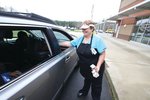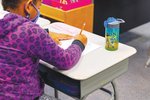


Back in March, COVID-19 interrupted what was otherwise a normal spring semester in Chatham County Schools.
But apart from the pandemic, CCS grappled with other issues as well: school attendance rezoning, broadband connectivity and a superintendent’s departure. Here’s a timeline looking at the major events that shaped the 2020 school year:
January
The year started normally enough, with school board decisions regarding pay and timelines for zoning taking place. At its Jan. 17 mid-year retreat, the CCS Board of Education voted to freeze teaching supplement spending at its current rate because of a gap between what’s available to spend and what would be required to meet the next increase.
The school board also approved a 74-cent-per-hour increase in pay for all of the district’s bus drivers. The additional $55,000 needed to cover the raise would come from state transportation funds, and will increase the pay range from $13.26 to $21.76 per hour to $14 to $22.50 per hour.
District CFO Tony Messer said Chatham County Schools approved a raise higher than the state-mandated increase in 2017, but surrounding districts are improving their salaries. The board approved the raise with little discussion, with board Chairperson Gary Leonard saying that “trying to stay competitive is wonderful.”
February
Bad weather at the beginning of the month led to some school closures after power outages across the district. The board decided that the four schools that closed would not have to make up those missed days.
Bonlee School, Bennett School, J.S. Waters School and Chatham Central High School each dismissed students early that Friday, Feb. 7, after power outages occurred on campuses. The day was then designated as an optional teacher workday.
School districts like Chatham regularly “bank” days in their calendars to avoid needing to have makeup days.
March
March began normally, with spring athletic events and standardized exams like the SAT scheduled to take place. But by March 12 — six days after the first Chatham COVID-19 case — CCS had canceled after-school events and limited visitors and volunteers.
The North Carolina High School Athletic Association had also announced it would postpone the rest of the boys and girls state basketball championships “indefinitely” and suspend all other athletic events — including practices and games — from March 13 until April 6. That was later extended through the semester.
On March 14, Gov. Roy Cooper’s executive order closed all public schools in North Carolina for two weeks. By Tuesday, March 17, CCS had already released a nutrition plan and published an at-home learning resource site. Before those two weeks were up, Cooper extended the “break” to May 15.
At its March 13 meeting, the BOE voted to suspend all schools-sponsored travel outside of North Carolina for the remainder of the school year.
“We haven’t dealt with this in our lifetime that we’ve had a pandemic with such potential to spread with such mild symptoms,” board Vice Chairperson Jane Allen Wilson said at the time.
The Chatham County Board of Education also approved a budget request that saw local expenses for public schools rise by nearly $2 million from last year.
The spending plan included a requested $2.23 million increase in county funds — coming in the form of $1.38 million for operating expenses for the new Chatham Grove Elementary School, which is slated to open in August, and $850,000 for previously frozen teacher supplements.
April
The district emphasized its efforts to distribute laptops and hotspots to students without reliable internet access. Though CCS had pushed similar initiatives before, the dependence on the internet for remote learning further revealed the broadband issues many Chatham families faced.
By September, the district said it had distributed nearly 1,000 hotspots since the spring, and was in the final stages of securing 42 bus hotspot locations. On April 24, Cooper announced that the state’s K-12 public school systems would continue remote learning for the remainder of the year and not re-open campuses.
May
The CCS Nutrition department hit the more than 100,000 mark for meals served since the pandemic, and Chatham Charter School ended its 2019-20 school year early. The Siler City public charter’s academic year was set to end on May 13, but due to a number of factors, instruction ended May 1.
June
CCS began working on its remote learning plan, to be submitted to the state July 20. The weekend of June 12-13, most of the district’s schools held varied forms of drive-thru graduations, as gathering limits in the state prevented traditional ceremonies from taking place.
July
On July 14, Cooper said that the state’s public schools would open under the hybrid learning Plan B option, though the fully remote Plan C was still an option for individual districts.
Earlier in the month, Chatham Superintendent Derrick Jordan told the News + Record the district had “no concrete plan” for reopening, but had been planning for all of the state’s potential options.
“I can tell you that we want kids back in school as quickly as possible, and as safely as possible,” he said. “We’re going to allow the folks who are experts in public health to make those decisions and we will spend the bulk of our time doing what we have been trained to do…”
On July 16, the BOE unanimously voted that the county’s public schools would go to the fully remote learning option for four weeks starting in the fall. The district also provided a Virtual Academy option, allowing families to make a semester-long commitment to a fully remote learning option, regardless of the board’s future decisions.
August
On Aug. 10, the board unanimously passed two highly anticipated motions at its regular meeting Monday: to extend Plan C at the county’s public schools from four weeks to nine weeks and to approve Scenario Three for Seaforth High School’s attendance zone.
The attendance zoning decision for Seaforth has been controversial, with many parents and community members expressing concern about the potential loss of resources at Northwood based on certain scenarios many felt would “cluster affluence” at Seaforth.
Aug. 17 marked the first day of classes — all taking place virtually across the district — and the remote opening of Chatham Grove Elementary.
An Aug. 31 announcement by Secretary of Agriculture Sonny Perdue said that the U.S. Dept. of Agriculture would extend waiver flexibility for school nutrition programs, allowing CCS to continue providing free meals to children 18 years old and younger through 2020. Between March 17 to Aug. 14, CCS provided 388,050 free meals.
September
On the 23rd, the BOE voted 4-1 for the county’s schools to continue classes under the remote learning “Plan C” option through the end of the semester, which ends Jan. 15.
At that meeting, members discussed employee survey results that showed nearly 30% of respondents indicated they felt comfortable returning to in-person learning, while 41% said they were not and 30% said they were unsure.
Less than a week later, the board pivoted, unanimously passing two motions: one approving in-person instruction under Plan B for Extended Content Standard E.C. students, Pre-K students and K-2 students, and a second allowing the resumption of extracurricular activities. The board also indicated other student groups would likely return before the previously decided January date.
October
On the 19th, Pre-K through 2nd grade students were able to return to their school buildings for hybrid learning, alone with Extended Content Standard students. This decision impacted just over 2,000 students: 98 Pre-K students, 134 E.C. students and 1,853 in K-2, along with their teachers and school staff.
The district also launched its COVID-19 Tracking dashboard, tracking positive cases in the district — with students from the Oct. 19 reopening date and staff from the first day of school on Aug. 17.
In Siler City, Chatham Charter school paused all face-to-face instruction and athletic workouts on Oct. 18 through its first semester, just 12 days after it began phasing in a return to in-person learning. The original decision was made due to one positive COVID-19 case in the school community. One other case tied to close contact with the original individual was reported.
November
Following the general election BOE race, the board stayed the same after incumbent candidates Melissa Hlavac and David Hamm comfortably maintained their seats on election night — Hlavac with a 25 percentage-point gap over her closest opponent and Hamm with a 23-point gap over his.
“I’m thankful to all those who voted for me and continue to have confidence in my abilities to help lead CCS,” Hamm said after results were announced. “I am also thankful that Melissa (Hlavac) won her race and the board stays in place for at least another two years.”
On Nov. 9, the board voted 4-1 for students in 3rd-5th grade to return Nov. 19, with students in 6th-8th to return Dec. 7.
At Woods Charter School in Chapel Hill, the WCS Board voted to continue remote instruction until Feb. 1 for 1st-12th grades. Kindergarten will remain on a hybrid schedule.
December
Since CCS partially reopened for students under Plan B on Oct. 19, there have been 27 positive COVID-19 cases among students and 30 among staff (42 total staff cases since Aug. 17), according to the district’s COVID-19 Tracking dashboard and administrators as of Wednesday morning.
Superintendent Jordan announced he would leave his current role in early 2021 to join the staff of N.C. Superintendent-elect Catherine Truitt at the state’s Department of Public Instruction. The BOE began the process of identifying an interim superintendent in early December — ultimately selecting Dr. Randy Bridges, who comes from Orange County Schools — on Dec. 15.
The district began its winter break after a half-day Dec. 18, to resume classes Monday, Jan. 4. The week of Christmas, 14 new COVID-19 cases were reported among students and staff.
On Christmas Day, Siler City Elementary School teacher Janet Brady Bridges, 45, died at Chatham Hospital. Multiple unconfirmed sources said she died from COVID-19 complications, which, if true, would mean she was the first CCS member to die due to the coronavirus. She was in her 22nd year of teaching at Siler City Elementary.
Reporter Hannah McClellan can be reached at hannah@chathamnr.com.